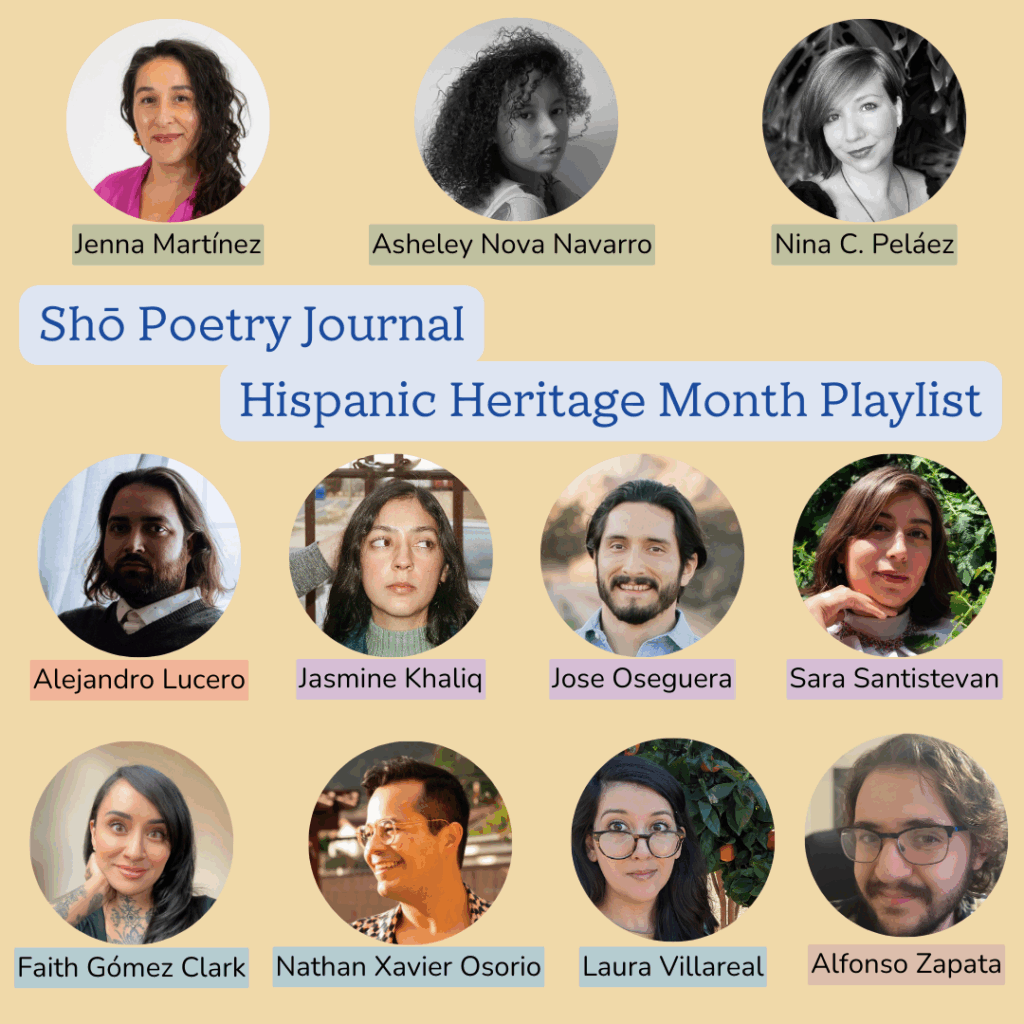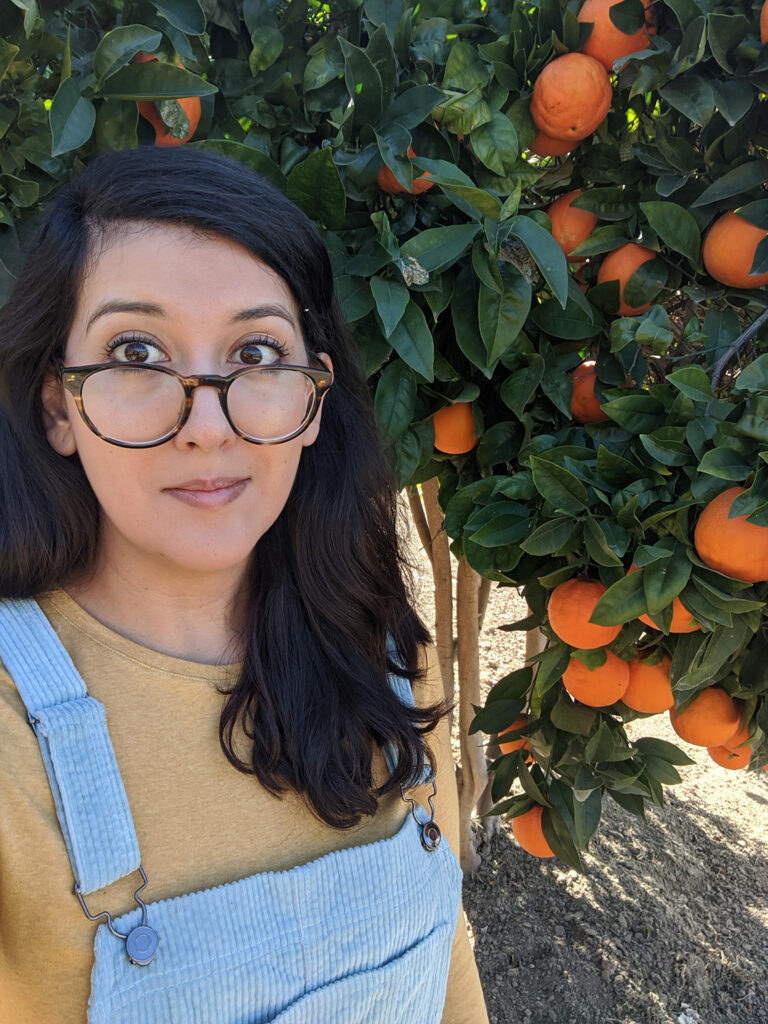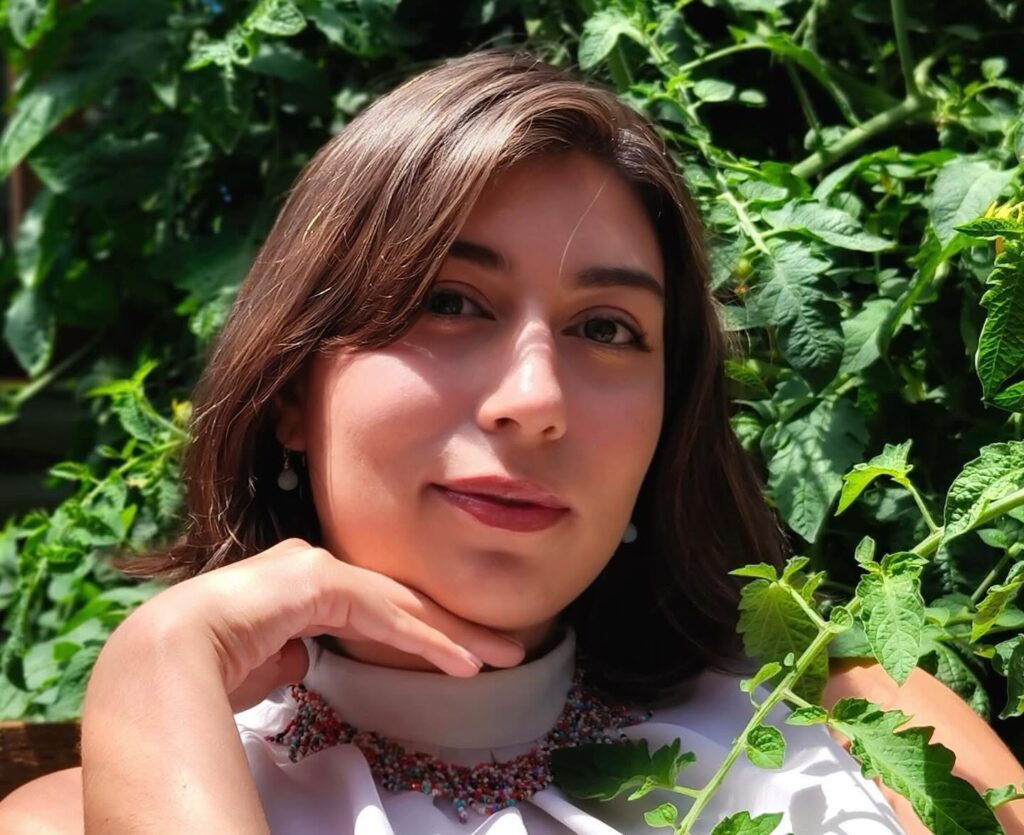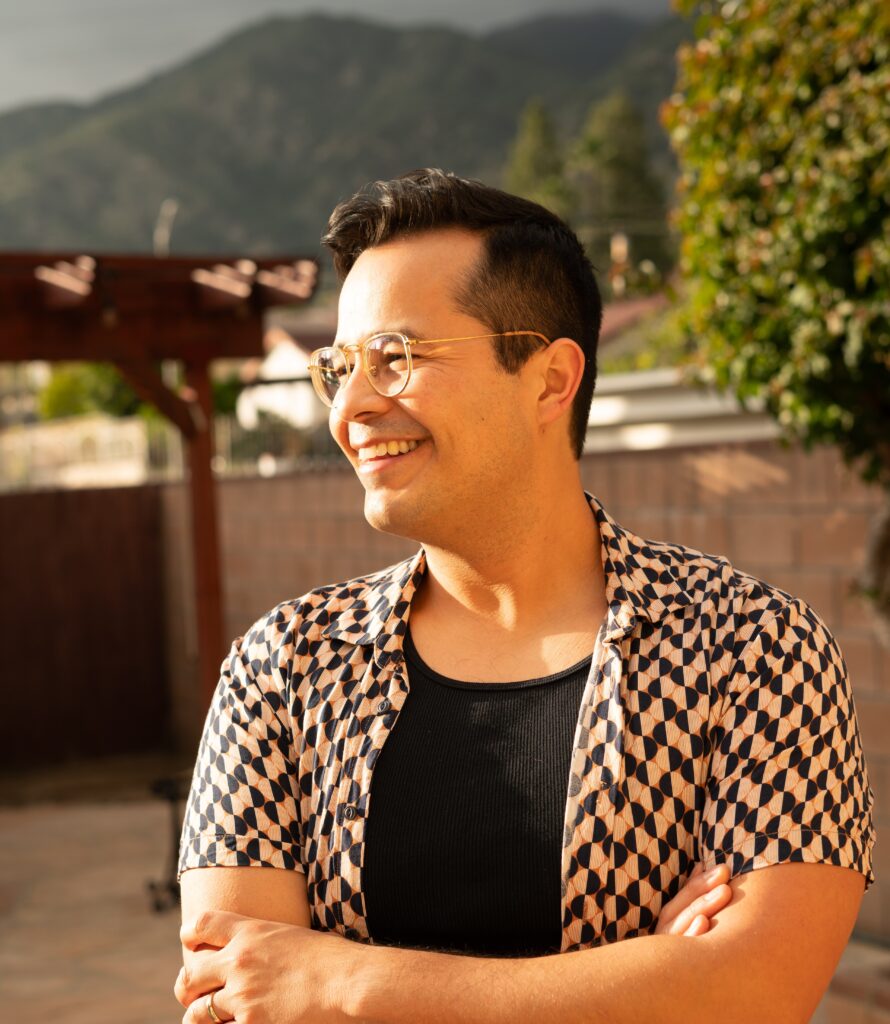
To celebrate National Hispanic Heritage Month, we’ve curated this selection of poems by US-based Shō Poetry Journal contributors. This playlist features audio recordings by Jenna Martínez, Asheley Nova Navarro, Nina C. Peláez (Shō No. 7); Alejandro Lucero (Shō No. 6); Jasmine Khaliq, José Oseguera, Sara Santistevan (Shō No. 5); Faith Gómez Clark, Nathan Xavier Osorio, Laura Villareal (Shō No. 4); and Alfonso Zapata (Shō No. 3).
Table of Contents[Hide][Show]
- “In a Stranger I Make a Nest” by Jenna Martínez
- “Doubt” by Nina C. Peláez
- “Ode to the Foreskin” by José Oseguera
- “Holy Week” by Asheley Nova Navarro
- “Charm to Separate Yourself from Another” by Jasmine Khaliq
- “Returning” by Alejandro Lucero
- “After the tornadoes touchdown” by Laura Villareal
- “Abecedarian of Xinachtli” by Sara Santistevan
- “How to Cook a Wolf” by Nathan Xavier Osorio
- “The Seance” by Faith Gómez Clark
- “The Ghazal I Asked For” by Alfonso Zapata
“In a Stranger I Make a Nest” by Jenna Martínez
I ask him to describe it to me.
The essence of me: a stranger
to myself.
He whispers, it’s like we
have been doing this a long time.
“In a Stranger I Make a Nest” appeared in Shō No. 7.

Jenna Martínez is a queer Mexican-American writer and printmaker, a finalist for the Jack McCarthy Book Prize, and a Literary Cleveland Breakthrough Writing Resident. She writes about borders, desire, friendship, and the expansiveness of queerness. Her poetry has appeared in The Kenyon Review, HAD, Shō Poetry Journal, Cleveland Scene, Homology Lit, and elsewhere. Her work has been supported by the Macondo Writers Workshop and Community of Writers Workshop. Originally from San Antonio, Texas, she lives in Cleveland, Ohio.
“Doubt” by Nina C. Peláez
At the cattle farm, I fell in love with a boy
who thought he was a god. I too, believed
this sometimes.
About this poem: I started working on this piece over 15 years ago, while staying at a friend’s family farm one summer, and it has moved through many, many iterations. It was first fragments, then a series of short poems, and at one point, a short story that I abandoned when a teacher’s response was “the writing is beautiful, but stories are about people in trouble.” Yet, something kept pulling me back to these memories time and again. It took me this long to come to see what I was really writing about, to see the shadows that had been sitting in the periphery of that landscape all along.
This poem was selected as the runner-up of the Sita Martin Prize for Shō No. 7.

Nina C. Peláez (www.ninapelaez.com) is a poet, essayist and educator based in Maui, HI where she works as Associate Director for The Merwin Conservancy. An adoptee and daughter of a Cuban exile, she was born in Las Vegas, Nevada and raised in Brooklyn, NY. A Best New Poets and Best of the Net nominee, recent work appears or is forthcoming in journals including The Atlantic, The Iowa Review, Prairie Schooner, Narrative, Rattle, Waxwing, Willow Springs, Pleiades, & Verse Daily, among others. She was recently awarded the Walt Whitman Birthplace Association/ Gwenn A. Nusbaum Scholarship, a Barbara Deming Memorial Fund Grant, and the Coniston Prize by Radar Poetry and her work has been supported with scholarships and fellowships from Yaddo, Tupelo Press, Key West Literary Seminars, Hudson Valley Writers Center, and the Association of Writers and Writing Programs, among others. She holds an MFA in Poetry from Bennington College where she was a 2025 Alumni Teaching Fellow. She also mentors for The Adroit Journal and is a Tin House Reading Fellow. She is working on her first book. Find her on social media @ninacpelaez.
“Ode to the Foreskin” by José Oseguera
How little and inconsequential you seemed,
the last animal to cross the Ark’s threshold
About this poem: In “Ode to the Foreskin,” fragility and innocence collide with the violences of masculinity imposed on the Hispanic body. The poem confronts how tenderness in boys is cut away—ritually, socially, and spiritually—leaving men alienated from both their bodies and their inner lives. In a culture where machismo is reinforced by mainstream figures like Joe Rogan or Theo Von, sensitivity becomes taboo, vulnerability a mark of shame. This piece reclaims the foreskin as a metaphor for what is lost, asking how Hispanic masculinity might look if softness were not mutilated but allowed to survive.
“Ode to the Foreskin” appeared in Shō No. 5.

José Oseguera is a Mexican American poet writing at the intersections of memory, myth, and the body. He is the author of The Milk of Your Blood (Kelsay Books, 2021) and And This House Is Only a Nest (Homebound Publications, 2024). His forthcoming manuscript, [untitled mother], explores the intergenerational bonds of family, faith, and inheritance, where tenderness and violence shape the sacred and the everyday.
“Holy Week” by Asheley Nova Navarro
We are mostly bad Catholics, all of us, who
do not bear ash nor cover our mirrors with cloth.

Asheley Nova Navarro is a Dominican poet living in Atlanta, Georgia, where she edits for Sontag Mag and serves as a reader for The Adroit Journal. Her work is featured or forthcoming in Brink, Waxwing Literary Journal, wildness, North American Review, and elsewhere, and recognized by the Emerging LatinX Poetry Fellowship awarded by Isabella DeSendi.
“Charm to Separate Yourself from Another” by Jasmine Khaliq
With silver dagger cut a lock of your hair. Cut a lock of theirs as they sleep.
About this poem: I had a journal which looked a lot like, according to my friend Will, a witch’s journal. So I wrote a spell. He also took this picture of me.
“Charm to Separate Yourself from Another” appeared in Shō No. 5.

Jasmine Khaliq is a Pakistani Mexican poet born and raised in Northern California. Her work is found or forthcoming in 32 Poems, Passages North, Poet Lore, The Rumpus, Bennington Review, and elsewhere. She holds a BA from San Francisco State University and an MFA from University of Washington, Seattle. Currently, Jasmine is a Ph.D. Candidate in English and Creative Writing at the University of Utah.
“Returning” by Alejandro Lucero
Talk about your grandmother
who squeezed when the bodies of gophers popped up in the crosshairs
of the family rifle.
About this poem: Sestinas make for such fun headaches! It’s my favorite form because I love playing with homophones and testing the limits of the end-word. The form’s repetition also helps me think through patterns and cycles people and places go through. In this poem, I am thinking about how patterns, cycles, and repetitions fail our bodies and our land.
“Returning” appeared in Shō No. 6.

Alejandro Lucero’s chapbook, Sapello Son, was named the Editors’ Selection for the 2022 Frost Place Competition (Bull City Press, 2024). His latest work appears and is forthcoming in Best New Poets, The Cincinnati Review, Gulf Coast, The Florida Review, and The Southern Review. He lives in Baltimore, where he teaches in the Writing Seminars at Johns Hopkins and is a managing editor for The Hopkins Review.
“After the tornadoes touchdown” by Laura Villareal
the turkeys arrive while I’m deciphering
the if this, then that of taxes.
About this poem: So much in American life is crafted to wear us down.
“After the tornadoes touchdown” appeared in Shō No. 4.

Laura Villareal is a poet and book critic. Her debut poetry collection, Girl’s Guide to Leaving, was awarded Texas Institute of Letters’ John A. Robert Johnson Award for a First Book of Poetry and the Writers’ League of Texas Book Award for Poetry. She is currently an associate with Letras Latinas, the literary initiative at the University of Notre Dame’s Institute for Latino Studies. Alongside Diannely Antigua, she is co-editing a new anthology of Latinx poetry titled We Come from Everything: Poetry for the 21st Century forthcoming from Graywolf Press in 2027.
“Abecedarian of Xinachtli” by Sara Santistevan
Growing up, there was one river to aspire to, and the other to bury.
About this poem: “Abecedarian of Xinachtli” is one of the narrative turning points in my chapbook, The Root from which Freedom Blossoms. The project as a whole began as a way to process the confusion I had as a child about my Latinidad, and with the hope it might reach young women of color who are similarly struggling. As I entered adulthood, I realized the path to self-love required unlearning shame and silence and re-learning my cultural roots and family’s practices. This process, at least to my subconscious, mirrored learning the alphabet, phonetics, and other building blocks of language (hence the Abecedarian form). This poem is also an ode to nepantla: to embracing in-between and multiple identities not as fracture, but as abundance.
“Abecedarian of Xinachtli” appeared in Shō No. 5.

Sara Santistevan is an emerging Latina poet and recipient of the 2021 Reyna Grande Scholarship for her first chapbook, The Root from which Freedom Blossoms (Fauxmoir). She has work published or forthcoming in The Acentos Review, Querencia Press’ Anthology We Were Seeds: An Anthology Benefiting Palestine, Seventh Wave’s Community Anthology On Girlhood, and more. Outside of her 9 to 5 in the legal world, Sara is a Junior Editor, reader, and occasional editorial writer with F(r)iction. Sara enjoys visiting cafes, going on aimless walks in city/landscapes, and dreaming of the day she’ll have her own cat.
“How to Cook a Wolf” by Nathan Xavier Osorio
My mother fell in love with the way you cracked
into an urchin.
About this poem: This poem is inspired by M.F.K. Fisher’s, How to Cook a Wolf. I was struck by Fisher’s lyrical prose and how she reimagined the form of the “cookbook” as a space where we could have a conversation on hunger and survival during crisis. By borrowing Fisher’s title I wanted to invoke her grief-ridden idea of having to eat a beautiful animal like a wolf and let it loom in the background. I wanted to sit with that unsettling energy.
“How to Cook a Wolf” appeared in Shō No. 4.
For more of Nathan Xavier Osorio’s work, read his interview with Claire Zhou.

Nathan Xavier Osorio’s debut, Querida, won the 2024 Agnes Lynch Starrett Poetry Prize and was a finalist for the California Book Award and the Norma Faber First Book Award. He was a Chancellor’s Postdoctoral Fellow at UC Irvine and is an Assistant Professor of Creative Writing at Texas Tech University.
“The Seance” by Faith Gómez Clark
After her death, she returns to me as a black goat. Nights, she stands at the foot of my bed and stares at me, her eyes, two crystal orbs glowing.
“The Seance” appeared in Shō No. 4.

Faith Gómez Clark (she/they) earned their MFA in Poetry from Warren Wilson. She has received fellowships from Virginia Center for the Creative Arts and Vermont Studio Center. She a Pushcart Prize nominee. Their work can be found or is forthcoming in Salt Hill Journal, CALYX, Huizache Magazine, Shō Poetry Journal, and elsewhere.
“The Ghazal I Asked For” by Alfonso Zapata
What to do with these words; arrange them? Play Tetris
with image, hold an adverb, flip familiar, overheard words
“The Ghazal I Asked For” appeared in Shō No. 3.

Alfonso Zapata is a poet living in Lexington, Kentucky. He received his MFA in poetry at The University of Kentucky, and has attended The University of Toledo and The University of Southern Mississippi, where he received his MA in English. He has previously received the 2022 & 2023 University of Kentucky MFA Poetry Awards, and his poetry collection won the 2024 TRP Southern Poetry Breakthrough Prize. His chapbook, Together Now, was released in 2024 by Belle Point Press, and his debut poetry collection To Pay for Our Next Breath is available now.